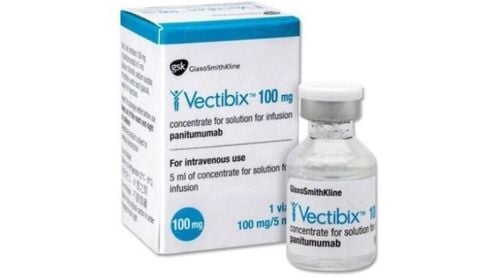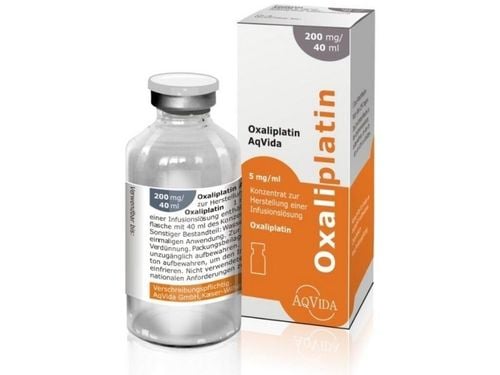This is an automatically translated article.
Crisapla is an anti-cancer drug and acts on the immune system. Let's learn more about its uses, usage and some precautions when using Crisapla,... in the following article.
1. What is Crisapla?
Crisapla is a drug used in the treatment of cancer as indicated. Crisapla is manufactured by Quality Pharma S.A. - HEN TI NA. Crisapla is registered in the country by Viet Phap Pharmaceutical Company Limited under registration number VN – 15847 – 12.
The main ingredient in Crisapla includes the active ingredient Oxaliplatin with the content of 50mg for Crisapla 50 and the content of 100mg for Crisapla. 100. In addition, Crisapla has a number of other excipients.
Crisapla is in the form of lyophilized powder for injection, packed in 1 box x 1 vial containing powder for injection.
2. Uses of Crisapla
Crisapla 50 or Crisapla 100 both contain Oxaliplatin, only the content is different. The use of the active ingredient Oxaliplatin - the ingredient in Crisapla is an anti-neoplastic drug belonging to the new group of platinum compounds. In Crisapla there is a platinum atom complexing with 1,2 - diaminocyclohexane ("DACH") and an oxalate group.
Oxaliplatin is the active ingredient in Crisapla that has a broad spectrum of action in vitro causing cytotoxicity. In addition, Crisapla in vivo has antitumor activity against a variety of tumors including colon and rectal tumors.
Between Oxaliplatin is the active ingredient in Crisapla Crisapla and 5-fluorouracil in vitro and in vivo has cytotoxic activity. In addition, Crisapla has also shown its in vitro and in vivo activity against cisplatin-resistant cancers.
Some studies on Oxaliplatin also show that it has an interaction with DNA that disrupts the ability of DNA to synthesize, thereby effective anti-tumor and cytotoxic.
Clinical experience in untreated colon and rectal cancer patients shows that when using Crisapla in combination with 5-Fluorouracil/folinic acid, it is twice as effective as when used alone. , the level of safety when using Crisapla varies between treatment regimens.
3. Specify Crisapla
Crisapla is indicated for:
Colon cancer; Rectal cancer ; To be safe while taking Crisapla, you need to take it as directed.
4. Dosage - How to take Crisapla
Crisapla 50 and Crisapla 100mg are prepared in the form of lyophilized powder for injection. Therefore, how to use Crisapla according to the first line, intravenous infusion as indicated and performed by medical staff.
The recommended dose of Crisapla is from 85mg/m2 body. IV infusion 2-6h in 250-500 mL 5% glucose, every 2 weeks;
Adjust the dose of Crisapla according to the patient's tolerance. In addition, when Crisapla infusion is combined with 5-fluorouracil, Crisapla should be infused first.
5. Contraindications Crisapla
Do not use Crisapla for the following subjects:
Hypersensitivity to the ingredients of Crisapla; marrow failure ; Peripheral nerves; Severe kidney failure; Pregnant; Breastfeeding; ... To be safe when using Crisapla not for the contraindicated group.
6. Crisapla . side effects
Some possible side effects when using Crisapla include:
Digestive disorders; Hematopoietic disorders; Sensory nerves; Oropharyngeal dysesthesia; Allergy; Ototoxicity; Renal toxicity; ... Monitor and inform your doctor about side effects when taking Crisapla.
7. Caution Crisapla
As recommended by the manufacturer, caution should be exercised when using Crisapla. Crisapla itself is a group of drugs used in oncology. Therefore, before using Crisapla, it is necessary to have a neurological examination.
In addition, the patient should also have a blood count checked before treatment with Crisapla
8. Preservation of Crisapla
Crisapla stored at room temperature.
Above is all information about Crisapla, patients need to carefully read the instructions for use, consult a doctor / pharmacist before using. Note, Crisapla is a prescription drug, patients absolutely must not buy drugs and treat them at home because they may experience unwanted side effects.













